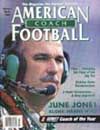Article CategoriesAFM Magazine
|
Paradise FoundWhen the NFL Beckoned, Hawaii\'s June Jones Answered A Different Call.by: Richard Scott © More from this issue June Jones would be lying if he said he expected this. The same is true of his coaches, his players and friends in the coaching profession. That's because it's not supposed to happen. Teams don't go 19 games without winning, then turn around and win eight regular-season games, capture a share of the conference championship, earn a bowl bid and then win the bowl game. It's not supposed to happen, especially to a team that faces the unique geographic obstacles that are part of University of Hawaii football. But it happened. It happened at Hawaii, in Jones' first season as the Rainbow Warriors' head coach as the Warriors completed the biggest turnaround in NCAA history, from 0-12 in 1998 and 19 straight losses from 1997-99, to an 8-4 regular-season finish, a share of the WAC championship and a victory over Oregon Sta....The full article can only be seen by subscribers.
|
|
|||||||
| HOME |
MAGAZINE |
SUBSCRIBE | ONLINE COLUMNISTS | COACHING VIDEOS |
Copyright 2025, AmericanFootballMonthly.com
All Rights Reserved





